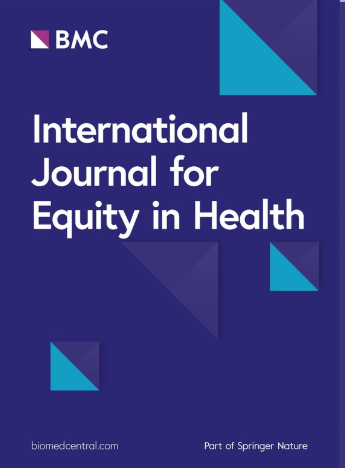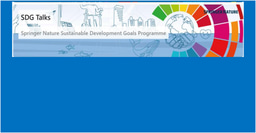Collection Highlight: Advancing Transgender Health Equity
Published in Social Sciences and Public Health

 In 2024, International Journal for Equity in Health launched an article collection on Advancing Transgender Health Equity as a response to the ongoing influx of submissions on this topic. With the submission deadline fast approaching, we examine the current publications through an SDG lens, particularly SDG 3, which sets the mission of ensuring 'healthy lives and promote well-being for all at all ages'.
In 2024, International Journal for Equity in Health launched an article collection on Advancing Transgender Health Equity as a response to the ongoing influx of submissions on this topic. With the submission deadline fast approaching, we examine the current publications through an SDG lens, particularly SDG 3, which sets the mission of ensuring 'healthy lives and promote well-being for all at all ages'.
The collection covers various publications from the UK to the US, Lebanon to Brazil, and though each deserves its single focus and analysis, almost all indicate that transgender individuals consistently report poorer mental and physical health compared to cisgender peers. Discrimination, stigma, and systemic barriers are often key drivers of these disparities.
As we ponder SDG3's motto of 'healthy lives for all', we must consider trans experiences in this context. It is well-documented that, due to fear of mistreatment, transgender and LGBTQ+ individuals may be more likely to avoid or delay accessing healthcare, which can ultimately lead to severe health consequences, so how can we guarantee that all means all?
There is still a lot of work to be done on the healthcare provider level, as many providers underestimate their own discriminatory behaviours, perpetuating biases that are damaging trans lives. There is a need for both training and structural reforms that enhance providers' knowledge and cultural competence, as it is still reported that some trans-specialists have "to be convinced of their patient’s transsexuality to carry out treatment" and have "doubts about whether some transgender individuals were suffering from gender incongruence or not". Equally concerning and noted is the uncertainty among healthcare providers regarding the classification of transsexuality as a mental illness.
Though these circumstances seem dire, they only fuel the need to advocate for improved conditions. Through research, education and policy changes, we can better understand diverse experiences and guarantee safer and equitable interventions that advance health equity - or, at the very least, demand it.
With more publications to come, we will broaden the conversation to other communities, recognising that minorities and marginalised groups often navigate on common ground, either by shared challenges, solidarity, or cultural intersections.
International Journal for Equity in Health is a BMC Open Access journal that presents evidence relevant to the search for, and attainment of, equity in health across and within countries. This can include the discussion of political, policy-related, economic, social and health systems- and services-related influences, particularly concerning identifying and understanding the systematic differences or the lived experiences of one or more aspects of health in population groups defined demographically, geographically, or socially.
Advancing Transgender Health Equity is hosted by the Editors-in-Chief, Dr Ana Lorena Ruano and Dr Pablo Gaitán-Rossi, and the Associate Editor, Dr Angel Phuti.
Submit your paper by 15 September 2025.
Follow the Topic
-
International Journal for Equity in Health

This journal presents evidence relevant to the search for, and attainment of, equity in health across and within countries and publishes research which improves the understanding of issues that influence the distribution of health and healthcare within populations.
Related Collections
With Collections, you can get published faster and increase your visibility.
Racism and Health
The ongoing advancement of our understanding of how racism impacts health - both directly and structurally - is crucial for addressing the deep-rooted health inequities that persist globally. Structural racism shapes health outcomes among racialized populations, contributing to inequities in healthcare access and quality, and impacting social, political, or environmental determinants of health. Existing research also connects direct and visible manifestations of racism, such as major and everyday discrimination, to negative health outcomes. At the same time, racism does not operate in isolation. A growing body of research shows how it intersects with other systems of oppression—such as classism and patriarchy—and with broader social determinants of health, producing compounded and context-specific inequities. An intersectional lens is therefore essential to understand how overlapping structures of power and exclusion shape health and healthcare experiences. These insights are essential in conducting rigorous and thorough health research, guiding anti-racist health policy, and ultimately, ensuring equitable health for all.
Looking forward, research holds the potential to develop new methodologies and indices and unveil complexities in how racism manifests within healthcare systems and societal structures. By deepening our collective understanding, we can develop more effective interventions that target the root causes of health inequities.
We invite researchers to contribute to this special Collection on Racism and Health, focusing on advancing our understanding and addressing health inequities. Topics of interest include but are not limited to:
- Racism as a structural determinant of health
- Racism as a direct determinant of health
- Racialized health outcomes in different populations
- Intersectionality and inequities in health, healthcare access and quality
- Nexuses between social, political, and environmental determinants of health and systemic discrimination
- Anti-racist health policy frameworks and systems
- Impact of racism on mental health
- Health inequities in reproductive, maternal, and child health
- Obstetric and reproductive violence
- Community-based interventions for equitable health
- Decolonizing health research and global health epistemologies
We strongly encourage contributions from racialized scholars and authors with lived experience or expertise in addressing systemic discrimination in health research.
This Collection supports and amplifies research related to SDG 3, Good Health and Well-Being and SDG 10, Reduced Inequalities.
All submissions in this collection undergo the journal’s standard peer review process. Similarly, all manuscripts authored by a Guest Editor(s) will be handled by the Editor-in-Chief. As an open access publication, this journal levies an article processing fee (details here). We recognize that many key stakeholders may not have access to such resources and are committed to supporting participation in this issue wherever resources are a barrier. For more information about what support may be available, please visit OA funding and support, or email OAfundingpolicy@springernature.com or the Editor-in-Chief.
Publishing Model: Open Access
Deadline: Aug 14, 2026
Mental Health Inequities in Crisis: Insights from South-East Asia
The importance of advancing our collective understanding of mental health disparities during extraordinary crises, particularly in South-East Asia, cannot be overstated. As the region faces a multitude of challenges—ranging from natural disasters to public health emergencies—there is a pressing need to explore the variations in mental health impacts across different communities. Significant strides have been made in this area, including the identification of specific risk factors, the implementation of culturally sensitive interventions, and the recognition of mental health as a critical component of overall well-being. However, much work remains to be done. Future research has the potential to uncover new insights into the social determinants of mental health, enhance intervention strategies, and inform policies that promote equity. By deepening our understanding of these issues, we can better address the unique mental health challenges faced by vulnerable populations in the region.
We welcome all article types, including original research, reviews, meta-analyses, and perspectives.
We invite researchers to contribute to this special Collection. Topics of interest include but are not limited to:
-Socioeconomic & Geographic Disparities in Mental Health Access
-Community-Level Heterogeneity in Mental Health Outcomes
-Social Determinants of Mental Health in Crisis Contexts
-Culturally Adapted Mental Health Interventions
-Youth Mental Health in Crisis: Vulnerability and Resilience
-Gender and Mental Health: Differential Impacts and Responses
-Stigma, Barriers, and Facilitators to Mental Health Care
-Digital Mental Health Innovations in Low-Resource Settings
This Collection supports and amplifies research related to SDG 3, Good Health and Well-Being.
All submissions in this collection undergo the journal’s standard peer review process. Similarly, all manuscripts authored by a Guest Editor(s) will be handled by the Editor-in-Chief. As an open access publication, this journal levies an article processing fee (details here). We recognize that many key stakeholders may not have access to such resources and are committed to supporting participation in this issue wherever resources are a barrier. For more information about what support may be available, please visit OA funding and support, or email OAfundingpolicy@springernature.com or the Editor-in-Chief.
Publishing Model: Open Access
Deadline: Jul 30, 2026





Please sign in or register for FREE
If you are a registered user on Research Communities by Springer Nature, please sign in